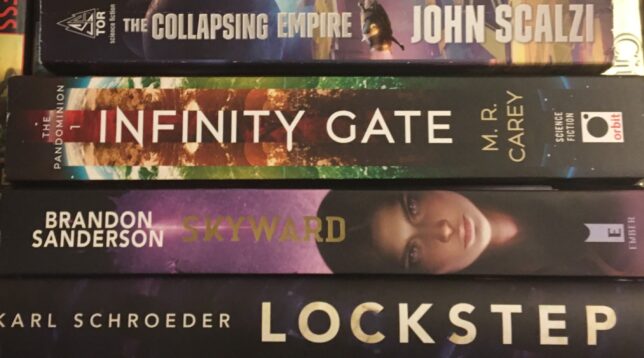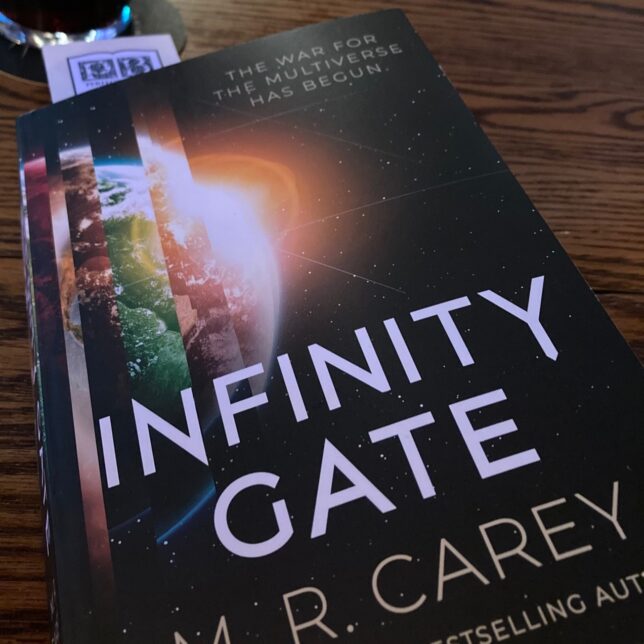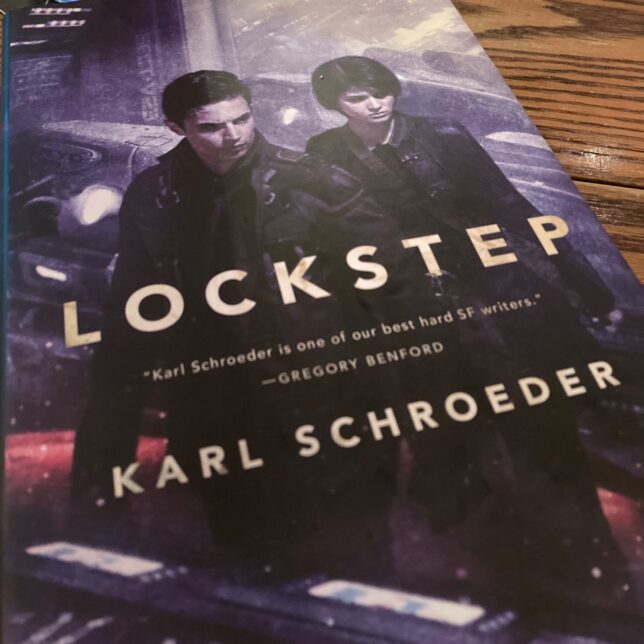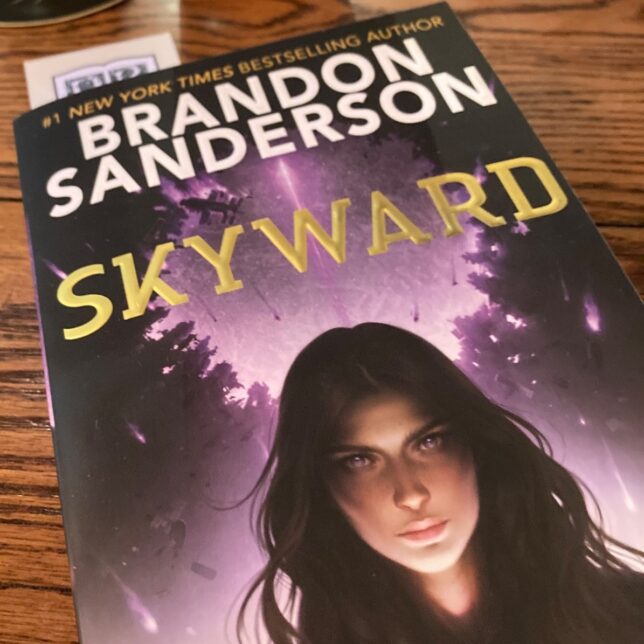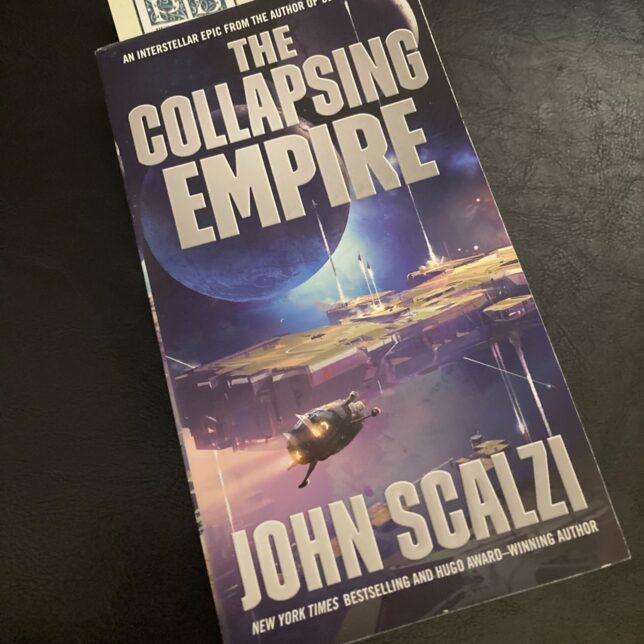Sometimes I’m the mood for space opera and other times I want more traditional, “hard” science fiction. March’s reads strike a balance between human-focused adventure stories in futuristic worlds ground in solid science fiction concepts.
Infinity Gate by M.R. Carey
After travelling though time by TARDIS, my next read had me jumping parallel universes using “step” technology. Infinity Gate wasn’t what I expected given the back cover blurb, and it was a bit of adjustment after previous reads. Many of the main characters are morally gray by nature, and I wasn’t immediately sure I liked them all that much.
The clever world-building and unexpected character arcs made for a compelling read, however, and by the end I was completely onboard – I don’t know where this series is headed, but I’m intrigued.
There are millions of universes in Infinity Gate, many of them conducting business with each other. Some universes aren’t worth visiting, while others are inhabited by what appears to be soulless artificial intelligence. These distinctions matter greatly as the story goes on, beginning with a scientist living in a parallel Earth on the brink of ecological collapse.
I only recently picked this up at the bookstore in my old neighbourhood in Ottawa during one of my recent visits, and the sequel isn’t out yet.
Lockstep by Karl Schroeder
A different type of stepping technology and a totally different tone characterizes Lockstep. If the system of how people on different worlds slept for decades to sync up to enable a futuristic human economy wasn’t so complicated, this could be a YA novel.
It tells the story of a teen boy who’s been asleep for 14,000 years as human civilization evolves and expands around him under the guidance of his sister and brother, because of the lockstep, they are middle-aged adults rather than long dead. The empire built by his siblings has developed larger than life myths about him and his family, so his reappearance could have serious ramifications on how this complex society going forward.
Schroeder eschews foul language and violence, but there is sufficient action and peril propelling the story forward. Some of the characters are a little underdeveloped, and Lockstep almost feels like the first book of a series that further explores this universe, but it’s a standalone novel. An enjoyable read that has me eager to read the other Schroeder books on my shelf.
Skyward by Brandon Sanderson
I’ve been wanting to give Sanderson a try for a while. As I’m more of a science fiction reader than fantasy reader, Skyward was the obvious choice. Like Lockstep, Skyward could easily be a YA novel given the age of the characters and overall tone. There is enough peril, however, to keep readers on their toes. Sanderson is not averse to killing off a character or two to show how high the stakes are, and makes you feel their loss.
There’s also an unfolding mystery at the heart of the story, and all isn’t what it seems. Although the story is told in the first person by our heroine, the supporting characters are well developed, and even the ones that only have a few lines or minimal development have an emotional impact.
Sanderson’s writing style and worldbuilding has me eager to read the sequel as well as his fantasy novels. Skyward has also prompted me to watch his BYU lectures on writing science fiction and fantasy and apply it to my own moribund fiction writing. Sanderson loves telling stories and it shows in writing and lectures.
The Collapsing Empire by John Scalzi
I’ve got lots of Scalzi books on the TBR, having only read Red Shirts many years ago. The Collapsing Empire seemed like a good choice to follow up Skyward, given the setting – humans in the future with spaceships. But that’s where the similarities end, as Scalzi’s writing style is quite different. His prose is very dialogue driven, and he’s generous with the swears.
But like Sanderson, Scalzi is great at establishing setting quickly and giving you a strong idea of how the world he’s built works with an interesting take on how humans in the future travel between worlds. The universe of The Collapsing Empire is clever, and the characters engaging. The plot moves forward at a fast pace, too, with a few twists. I’m looking forward to the sequel and reading more of Scalzi’s other work.
New Acquisitions
I’m proud of my restraint in 2024. I’ve bought relatively fewer books and most of them are previously enjoyed. In March I snagged one of The Chronicles of St. Mary’s books for a few bucks. I splurged on getting David Mack’s Firewall, which I’m eager to read as part of my April pile, despite not having finished any of the previous Star: Trek Picard novels.
I’d also like to tackle Dune since I want to read the books before I see the movies. My strategy continues to be to jump around from different genres and writing styles, so I don’t get stuck in a rut, even though I want to immediately read sequels and authors I know I enjoy. I’m also making a point of reading first books in series I own so I can quickly establish whether I want to commit myself to the sequels.
Gary Hilson is a freelance writer with a focus on B2B technology, including information technology, cybersecurity, and semiconductors.
